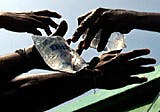With killer diseases such as cholera common to the region and lurking in the wake of the tsunami, international aid groups are coming through with plenty of clean water to the areas hardest-hit by the tsunami.
Dozens of planes packed with bottled water have arrived to stop people from drinking from contaminated streams. The Australian military has set up a mobile treatment plant producing 8,000 liters a day, to be handed out in refugee camps.
But two weeks after the tsunami, health specialists are expressing concern that the massive aid effort has not focused enough early attention on the corresponding health problem – lack of toilets.
"You just go to the river," Hajji Abdullah, 53, a village leader at the Mata'ie refugee camp at the edge of Banda Aceh, told a foreign correspondent for the Chicago Tribune.
Fortunately, officials have not reported widespread outbreaks of disease among the more than 87,000 refugees in Indonesia from the tsunami. But they are accelerating efforts to improve sanitation as part of a response system they have tried to perfect through years of disasters.
To prevent water-borne illnesses such as cholera, officials plan to soon start hiring refugees to dig latrines in the camps, said Ron Waldman, the World Health Organization's emergency response coordinator for Indonesia's Sumatra island.
"What worries me most? From what I've seen, the lack of sanitation," Waldman said. "It's easier to fly in water than to have the manpower to get the latrines dug. People are now aware that the sanitation has lagged."
United Nations officials estimated yesterday they now have reached most of the communities along the western coast of Sumatra that were damaged by the tsunami. They said food drops to those villages probably would continue "for months rather than weeks."
Cholera is believed to have originated in the area – in the Bay of Bengal region – and has spread around the world in seven separate waves called pandemics since the early 1800s.
The seventh pandemic began on Sulawesi island in Indonesia in the 1930s, Waldman said. "This is the homeland of cholera," said Waldman, a public health professor at the Columbia University in New York. "We know it's a threat here and throughout the tsunami area. We can control it, but we'd have to be ready."
At the Mata'ie refugee camp, near a military base in Banda Aceh, villagers said someone parked two water trucks nearby to distribute drinking water. But as of Saturday, no one had suggested they dig proper toilets.
At the Lhok Nga refugee camp down the coast, 1,300 refugees are getting their water from two massive blue drums of water from the Australian water operation. Also, a team from Firefighters Without Borders installed a small purification operation on the site.
Source: The Chicago Tribune


